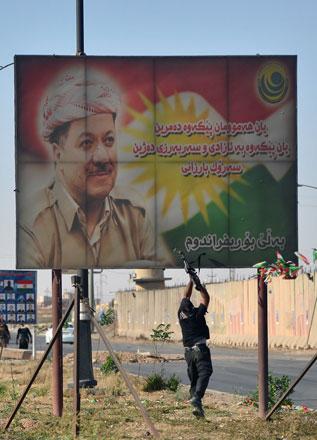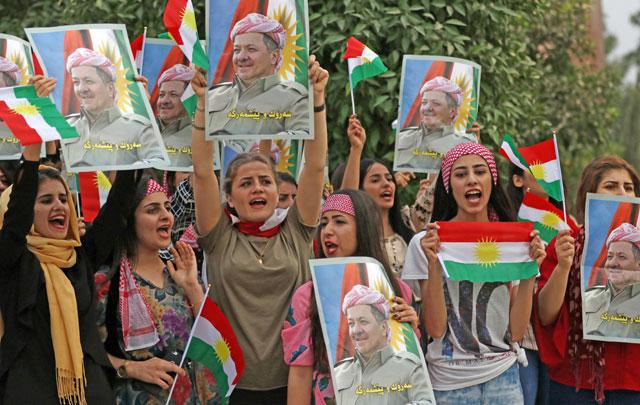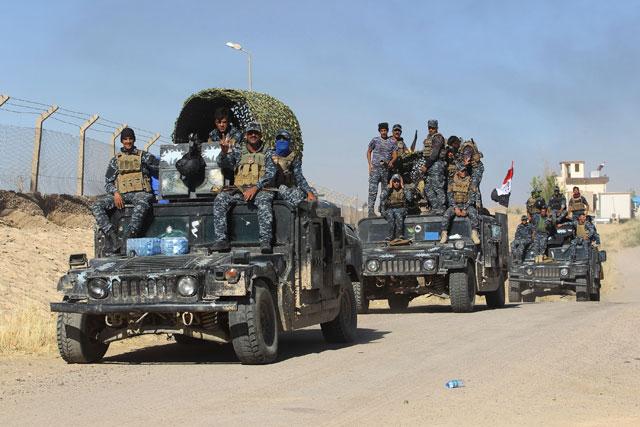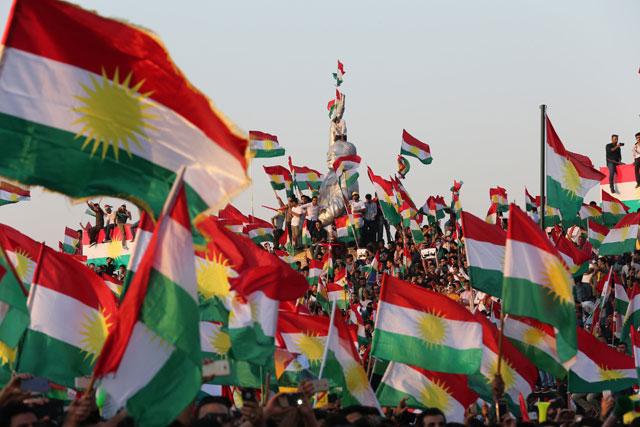You are here
Iraqi forces seize Kirkuk from Kurds in bold advance
By Reuters - Oct 16,2017 - Last updated at Oct 16,2017

A member of Iraqi security forces shoots at a poster of Iraqi Kurdish President Massoud Barzani in Kirkuk, Iraq, on Monday (Reuters photo)
BAGHDAD/KIRKUK — Iraqi government forces captured the Kurdish-held city of Kirkuk on Monday, responding to a Kurdish vote on independence with a bold lightning strike that transforms the balance of power in the country.
A convoy of armoured vehicles from Iraq’s elite US-trained Counter-Terrorism Force seized the city’s provincial government headquarters on Monday afternoon, less than a day after the operation began, a Reuters reporter in Kirkuk said.
A dozen armoured vehicles arrived at the building and took up positions nearby, alongside local police. They pulled down the Kurdish flag and left the Iraqi flag flying.
Neither side gave a casualty toll for the operation. But an aid organisation working in Kirkuk said several Peshmerga and members of the Iraqi forces had been killed in an overnight clash south of Kirkuk — the only serious fighting reported.
Some Kurdish civilians were fleeing the city of 1 million people in fear of reprisals. Crowds of ethnic Turkmen who opposed Kurdish control of the city were celebrating. Some drove in convoys with Iraqi flags and fired shots in the air.
“This day should become a holiday, we’re so happy to have gotten rid of Barzani’s party,” said a man celebrating on a motorbike, waving the blue-and-white flag of Iraq’s Turkmen, referring to the Kurdish leader Masoud Barzani.
Prime Minister Haidar Al Abadi ordered that the Iraqi flag be hoisted over Kirkuk and other disputed areas claimed by both the central government and the Kurds, who defied Baghdad to hold a vote for independence on September 25.
Baghdad described the advance as largely unopposed, and urged the Kurdish security forces known as Peshmerga to cooperate in keeping the peace. The Peshmerga said Baghdad would be made to pay “a heavy price” for triggering “war on the Kurdistan people”.
Washington called for calm on both sides, seeking to avert an all-out conflict between Baghdad and the Kurds that would open a whole new front in Iraq’s 14-year-old civil war and potentially draw in regional powers such as Turkey and Iran.
The overnight advance was the most decisive step Baghdad has taken yet to block the independence bid of the Kurds, who have governed an autonomous part of northern Iraq since the fall of Saddam Hussein in 2003 and voted three weeks ago to secede.
Kirkuk, one of the most ethnically and religiously diverse cities in Iraq, is located just outside the autonomous Kurdish zone. Kurds consider it the heart of their homeland; they say it was cleansed of Kurds and settled with Arabs under Saddam to secure control of the oil that was the source of Iraq’s wealth.
State TV said Iraqi forces had also entered Tuz Khurmato, a flashpoint town where there had been clashes between Kurds and mainly Shiite Muslims of Turkmen ethnicity.
The “government of Abadi bears the main responsibility for triggering war on the Kurdistan people, and will be made to pay a heavy price”, the Peshmerga command said in a statement, cited by Kurdish leader Barzani’s assistant Hemin Hawrami.
A Kurdish father of four who was driving out of Kirkuk towards the Kurdish regional capital Erbil said: “We no longer feel safe. We hope to return to our home but right now we feel it’s dangerous for us to stay.”
Washington, which arms and trains both Iraqi federal forces and the Kurdish Peshmerga to fight the Daesh radical group’s militants, called on “all parties to immediately cease military action and restore calm”, according to a US Embassy statement.
The military action in Kirkuk helped spur a jump in world oil prices on Monday.
Oilfields near Kirkuk halted production, but Baghdad said it would be quickly restarted.
“We’ve got confirmation from military commanders that it’s a matter of a very short time,” a senior Baghdad oil official told Reuters. “Our brave forces will regain control of all Kirkuk oilfields and then we will restart production immediately.”
Secession opposed by neighbours
Baghdad considers last month’s Kurdish independence vote illegal, especially as it was held not just in the autonomous region but in Kirkuk and other neighbouring areas the Kurdish Peshmerga occupied after driving out Daesh.
The Kurdish secession bid was strongly opposed by neighbours Iran and Turkey. Washington, allied with the Kurds for decades, pleaded vainly for them to halt a vote that could break up Iraq.
There were signs of internal conflict among the Kurds, who have been divided for decades into two main factions, the KDP of regional government leader Barzani and the PUK of his longtime rival Jalal Talabani, who served as Iraq’s ceremonial president in Baghdad from 2003-2014 and died two weeks ago.
Both Kurdish parties control their own Peshmerga units. While Barzani’s KDP strongly supported the independence referendum, some PUK figures were more circumspect.
Monday’s Peshmerga statement accused a group within the PUK of “treason” for assisting Baghdad’s advance. “We regret that some PUK officials helped in this plot,” it said.
Although Iraqi officials portrayed the Kurds as retreating without a fight, Kurdish officials said Peshmerga had clashed with the “Popular Mobilisation” — Shiite Muslim forces trained and armed by Iran that operate alongside regular Iraqi troops.
Fate unsettled
The status of Kirkuk and fate of the Kurds were left unsettled 14 years ago when a US-led invasion toppled Saddam.
During the years of US occupation that ensued, Washington leaned on its Kurdish allies to keep their ambitions in check to avoid triggering another war amid an insurgency by Sunni Muslim Arabs.
After Daesh swept across a third of Iraq in 2014 and were subsequently driven out, the Kurds found themselves in their strongest position on the ground for generations.
Their leader Barzani said the time had come for an independence referendum. But the vote angered neighbours and put pressure on Abadi to act.
Turkey, which had developed a good working relationship with the Iraqi Kurds and let the landlocked region export oil through its pipes, has swung behind Baghdad, furious at a secession move that might ignite similar demands from its own Kurds.
In a statement, the Turkish government said it would stand by Baghdad to provide peace and stability in the region.
Related Articles
BAGHDAD — Iraqi Kurdish political parties opposed to regional leader Masoud Barzani reported attacks on their offices in several cities over
BAGHDAD/KIRKUK — The Baghdad government recaptured territory from Kurds across the breadth of northern Iraq on Tuesday, making startlingly r
ERBIL Iraq — Iraqi Kurds were preparing to vote in a referendum set for Monday on independence for their autonomous northern region, d

















